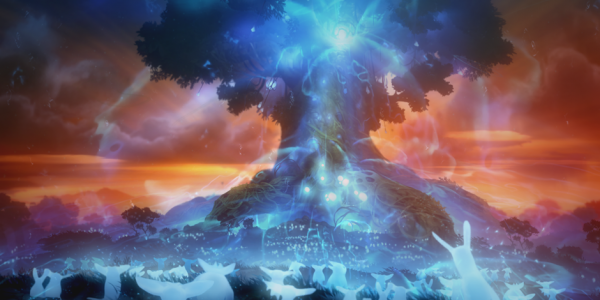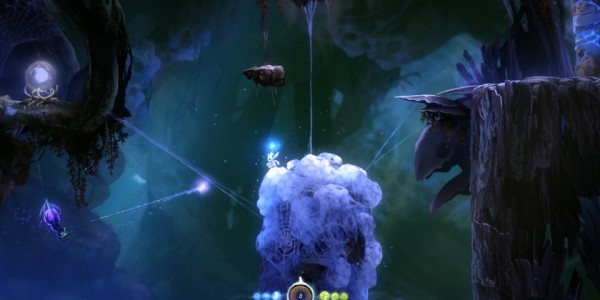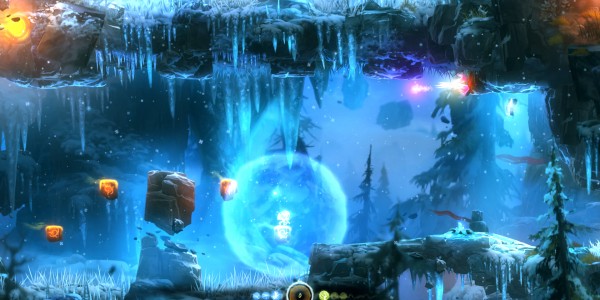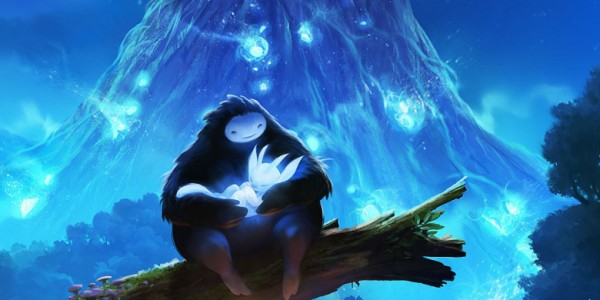Ori and the Blind Forest Review
"Appearances can be decieving"
Ori and the Blind Forest is a
stunningly beautiful piece of work. It's the sort of game that will have you stopping every now and then, just to wonder in awe at how far graphics technology has progressed, as well as how talented some of the artists in today's industry are. Every level is dense with layer upon layer of vibrant foliage, charmingly-animated creatures and exquisite lighting. The Every screen is a sight that you would happily make your desktop wallpaper, or maybe even hang on your wall in a portrait. The way main character Ori bounces through these environments, floating around elegant as a feather, is a delight to behold.

And this alluring beauty extends to the story the game tells. There's nothing complex about it, no pretensions about having a 'deep' plot. It's a simple tale of nature, the elements and, as incredibly cheesy as it sounds, harmony between all creatures of all sizes. It's very reminiscent of a classic Disney creation in the way that it chooses to paint a broader emotional adventure through silent character interactions,
Shadow of the Colossus-esque garbled voiceover and a wonderfully evocative orchestral soundtrack. There's no mental workout on display here, just a fantastic roller-coaster of an experience that shifts between moments of heart-pounding peril and moments of heartwarming appeal.
However, all of that said, underneath all the delicacy and grace,
Ori and the Blind Forest is also a
massive bastard of a game. In a good way
.
The core gameplay is platforming that is, believe it or not, more comparable to something like
Super Meat Boy than anything else. The basic
feel of the platforming isn't quite the same, it's much floatier and less precise in a way that recalls
Splosion' Man or perhaps the most recent
Rayman games. Yet the foundational loop of working your way through a tough platforming section, slowly getting better and better at it, bit by bit, until you
finally nail and get that rush of satisfaction is textbook
Super Meat Boy stuff.

Developers Moon Studios also made the rather smart inclusion of 'Soul Links,' which basically serve as these portable checkpoints you can lay down (almost) anywhere if you have enough of the required resource to create them. These soften the frustration somewhat of the more controller-breakingly difficult sections, allowing you to edge your way through if you're having just a ridiculously tough time of it. On occasion this mechanic does feel like an attempt to compensate for irritation caused by some of the more unnecessarily arduous passages of gameplay that pop up. Still, on balance it works as an astute little addition.
As I say though, the levels aren't as tightly designed as
Meat Boy's because of the sprawling nature of the game's world that comes with the 'Metroidvania' structure that is layered on top of that platforming.
Ori is this term in the classic sense, coming complete with all the things you expect such as a large map to uncover, backtracking down old paths with newly acquired powers so you can access new areas, pickups that extend your health etc etc. There's also an ability tree that allows you to unlock various upgrades for your basic powers.
None of these facets are particularly groundbreaking stuff in the wider scheme of things, but they are nonetheless executed on especially well. The pacing with which you obtain new abilities is spot-on and the feel of interconnection between various parts of the map is very fluid. The puzzles you'll encounter, both those that are platforming-based and those of the more traditional mental-workout variety, straddle that thin line between laborious and punishing deftly too.
The only levels that begin to really the test the patience are the Spirit Tree sections that act as a sort of bookend for each of the game's three acts. These levels that act as mini dungeons unto themselves with their own mechanics and are generally quite fun. However, each one ends in a frantic escape sequence as they collapse around you. These races against time can be alternately thrilling and completely frustrating, often resulting in having to retry one little tricky bit of platforming over and over. Some downright unfair checkpointing and the restriction of your 'Soul Link' ability does nothing to help their enjoy-ability either.
 Ori and the Blind Forest's
Ori and the Blind Forest's biggest downfall though is it's prohibitive attitude when it comes to replay value, and allowing you to really explore every inch of it to your heart's content. I completed the game in around half a dozen with a quite high percentage of exploration and pickups found. A decent length for the quality of the experience if you ask me, especially considering I still had a bit more stuff open to me. Afterwards I felt inclined to dive back in and complete all the other bits and bobs I'd missed but, unfortunately, there is no new game plus (although the developers have said it is coming in a future update). Additionally, the game forbids you from entering some areas after you've been through them with no real warning that it is going to do so.
I also encountered a few bugs in my time with it. The occasional framerate issue puts a dampener on what is an otherwise beguiling game to look at. More alarmingly though, the game crashed on me several times in my first hour or so with it and, in one specific moment, failed to save for some unknown reason. After these first handful of instances I had no other similar problems so I am willing to concede that it may just have been a one-off issue with my Xbox or something like that. Still though, I'd advise caution just in case this worries you.

Concerns though are few and far between when it comes to this game for me. I will admit some fatigue with 2D platformers over the past few years. The rise of indie development and the popularity of titles like
Braid has brought just as much unworthy guff as it has instant-classics. Regardless
Ori and the Blind Forest sidesteps whatever niggling cynicism I might have by being a sumptuous emotional experience, a joy to look at and a downright delight to immerse yourself in playing.
Pros
- Stunning visuals all round
- Nice and simple Disney-esque adventure of a story
- Challenging platforming that for the most part stays satisfying
- Excellent execution of 'Metroidvania' tropes
Cons
- Occasional platforming sections can be a bit overly frustrating
- Some technical issues
- A prohibitive attitude towards letting you explore every nook and cranny as much as you'd like to



